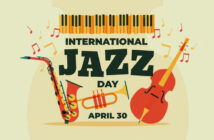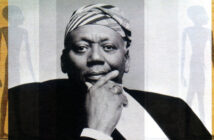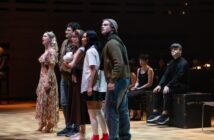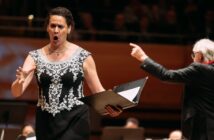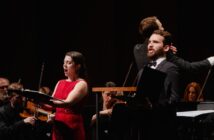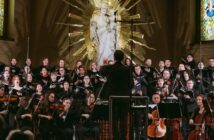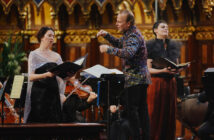Annette Peacock
Nothing Ever Was Anyway
Pop Montreal Music Fest
September 25, 2016
Between two numbers heard in the recent solo performance of singer-songwriter-pianist Annette Peacock, two people slipped away from their aisle seat. A short pause ensued to which the artist laconically interjected: “Only the brave stick it out to the end.” Adding: “It only gets deeper from here.” And “slower” may we add.
Few musicians are as offbeat as this songstress. Nee Coleman, she has kept the name of her first partner, bassist Gary Peacock (of Keith Jarrett trio fame), their marriage lasting six years. In 1966, she was now paired with pianist Paul Bley, the couple pioneering the use of the newly invented Moog synthesizer, both having literally lifted the prototypes from the inventor’s workshop. For three intense years, they presented their groundbreaking Synthesizer Show, albeit with middling success. During an enlightening artist’s conversation held the day previous to the concert (more on that later), Peacock pointed out that both were booed off stage in Europe. In 1970, this unit even performed in Montreal, Bley’s home town, in an era when experimentation was at a prime in music, and anything new was measured on a yardstick of strangeness.
Now 46 years later, Annette Peacock was paying the city her first return visit, an fact amazing in itself. But for her, playing before an audience is an exceptional occurrence, even back home in the States. Few stage artists have been more elusive than her, both live and on record, two traits that by themselves guarantee her status as a “cult musician.” Her last album in fact, and most widely distributed one, dates back to 1998. Released on the ECM label, An Acrobat’s Tale is a collection of moody songs delivered in her unique fragile voice, with atmospheric string quartet accompaniments, a rarity for her, given her preference to work alone.
For some, she remains connected to the jazz world, having lived through the turbulent sixties and hanging around the then nascent free jazz scene, although none of that music’s high energy ever seeped in to her intensely private musical universe. Others, in contrast, got to know her as a collaborator of rock icon Bill Bruford in the seventies, during her 20 year stay in the United Kingdom. Because of these antecedents, it was no surprise to see more grey and balding heads in the audience of this concert, surely more than any of the other shows billed in this youth-centric event.
Currently a resident of Woodstock (the one of legendary rock fame), she very rarely performs. Thus her Montreal appearance was made that more special, for it may well have been the last chance to see her live. The hall, a one-time Irish church now a Ukrainian cultural centre, is a somewhat austere room that seemed all the more fitting for her recital.
But on that evening, there was an opening solo by Joanne Pollock (almost a namesake), a vocalist hailing from Winnipeg. Smothering her voice in a wash of lugubrious electronic sounds totally obscured whatever lyrics she was singing, resulting in a pointless exercise of sonic narcissism. While short (mercifully), the set was nothing less (or more) than egregious. Obviously not my cup of tea.
After a much too long intermission, the main act was to begin. With a single grand piano, tail facing the audience, Peacock entered on an almost blackened stage, sitting on a high stool before her keyboard at the rear. A series of spotlights in front of thick black curtain shone in her back, but none in front of her, leaving her face veiled to the audience. Over the course of her set, she sang a variety of her songs, at times adding some synthesizer drones or drum loops (after all, it was a pop festival), her piano eking out small melodic kernels over sparse chords suspended in space. Her voice, as mentioned, is a fragile bird-like soprano, vibratoless, at times doubled by a piano line, at times simply spoken out.
Listening to Annette Peacock is like floating in a somewhat murky dream, yet the quietness is underlaid by a rare degree of intensity that captivated the audience from start to finish. Along the way, she played two instrumentals, the second being the longest, and whose title is the very one given to this review. Clearly a highpoint of the evening. As an ending, she triggered a looped sample of her voice, and walked off the stage to enthusiastic applause without giving a bow to the audience, and returning discreetly to pick her things afterwards, as most of the audience was pouring out of the hall.
As for the Saturday afternoon talk, she entered a small conference room bedecked with a wide sea blue cap and a large pair of sunglasses over her eyes, as if wanting to preserve her anonymity at all costs. Annette Peacock thus sat down on a small stage for an hour-long interview. Like her concert, all recordings and pictures were strictly verboten, the event’s official photographer included. In spite of the the shades, she even nabbed an attendee holding up a cell phone. While somewhat short on words at the start, the interviewer was successful in getting her to open up; so much so that she was became quite forthcoming about her early experiences. The daughter of a professional violist, she began taking piano lessons with a teacher, but had little interest in going through any kind of formal training. Instead, she simply wanted to figure out the instrument on her own terms, as a means of personal expression. Actually, the talk focused mainly on her life experiences, her meetings with musicians, yet an actual discussion of what makes her tic musically were not really addressed. By hour’s end, there was but time for two short questions, after which she just made rather hasty exit, obviously not willing to take time to talk with those present (though she was kind enough to sign a few of her albums brought by a fan of hers).
In music, like any another other walk of life for that matter, there are conformists, even a fair number of non-conformists who strive to be different. As for Annette Peacock, she’s one step removed from the latter, because she dares to be different from those who are different.
And one final note, for all Peacock enthusiasts out there: she is currently working on a new record, to be released (next year?) of her own Ironicmusic label. But by her own admission, it is taking her more time to finish than expected. But need we be surprised by this, considering her parsimonious discography that need not be counted on more than two hands?


